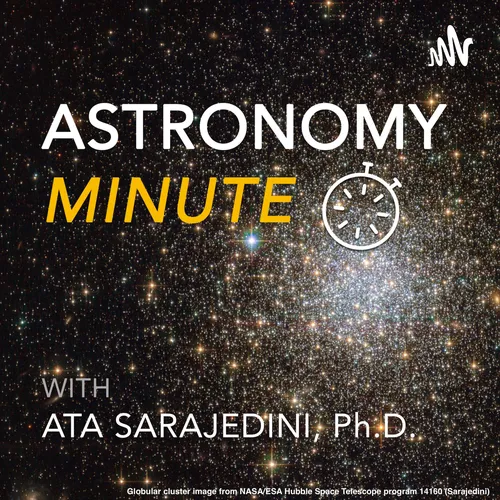
Astronomy Minute
Learn the basics of astronomy in one-to-two minute packets of concise information about specific topics. You are a busy person with a short attention span, and you want to learn about astronomical topics in a short amount of time. Your host Professor Ata is a PhD research astronomer and astrophysicist and a noted authority on stellar and galactic astronomy. I welcome your feedback at [email protected]. See the web site astronomyminute.org for more. The podcast logo is courtesy of Zachary Greathouse and shows a globular cluster photo taken by the author with the Hubble Space Telescope.
- Update frequency
- every 3 days
- Average duration
- 1 minutes
- Episodes
- 183
- Years Active
- 2020 - 2023

What is an Astronomical Observatory?
A brief description of what constitutes and astronomical observatory with a few examples in the real world that you have probably heard of.

What is Occam's Razor?
A brief description of the philosophical concept known as Occam's Razor, which asserts that “the simplest explanation of a particular natural phenomenon is usually the correct one.”

Why is the Webb Telescope Optimized to Observe Infrared Light?
A brief description of why the Webb Telescope is optimized to observe infrared light. Hint: it has to do with the four main science areas that it will be studying: “Other Worlds,” “Star Lifecycle,” “…

What are the Main Science Goals of the Webb Telescope?
A brief description of the four main science goals of the James Webb Space Telescope - “Other Worlds,” “Star Lifecycle,” “Galaxies Over Time,” and “Early Universe.”

What is the James Webb Space Telescope?
A brief description of the James Webb Space Telescope and how it's different than the Hubble Space Telescope.

What is the Hubble Space Telescope?
A brief description of the Hubble Space Telescope and its scientific capabilities.

Why Do We Put Telescopes in Space?
A brief description of the two primary reasons why we send telescopes into space to observe and study celestial objects.

What is Meant by Spiral Nebula?
A brief historical summary of what we mean when we refer to "Spiral Nebulae."

What is the Big Crunch?
A brief description of what will happen if the universe stops expanding and collapses back on itself - this is known as the Big Crunch.

What are the Basic Properties of Astronomical Objects?
A brief description of the basic properties of astronomical objects such as mass, radius, distance, luminosity, and temperature.

What is the Local Group of Galaxies?
A brief description of the Local Group of galaxies which contains the Milky Way, the Andromeda galaxy, and dozens of dwarf galaxies all gravitationally bound to each other.

What Does it Mean to “Know” Something in Science?
A brief description of what scientists mean when they say we "know" something.

How Can Atoms and Thus Matter be Mostly Empty Space?
A brief description of the structure of atoms - how they are mostly empty space - and why the everyday objects you use don't collapse and fall in on themselves.

What are Interacting Galaxies?
A brief description of what we mean when we talk about interacting galaxies.

How do the Sun and Other Stars Shine?
A brief description of nuclear fusion, which is the process by which stars produce light so that they can shine.

What are Giant Molecular Clouds?
A brief description of giant molecular clouds and why they are important for stars.

How do We Know that the Milky Way Galaxy is Spiral in Shape?
A brief description of the observational evidence we have supporting our assertion that the Milky Way galaxy is spiral in shape.

What is Meant by the 21 Centimeter Radiation of Hydrogen?
A brief description of the 21 centimeter radiation (light) that the Hydrogen atom emits and the mechanism behind this emission.

How are Neutron Stars and Pulsars Related?
A brief description of what astronomers mean when they say that "all pulsars are neutron stars but not all neutron stars are pulsars."

What is a Neutron Star?
A brief description of neutron stars, which are essentially the end state of massive stars some of which become pulsars.